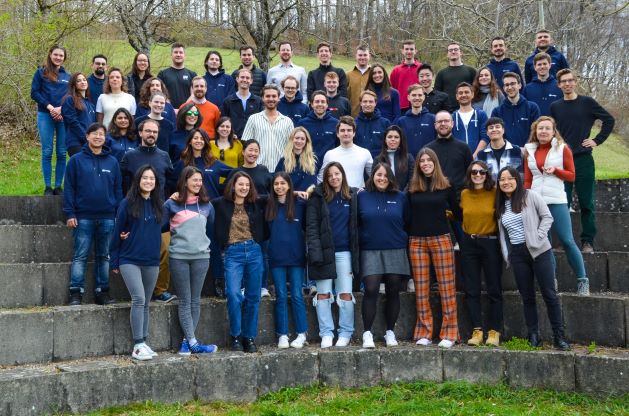
Growing a startup is hard. You’ve got to have the right idea, market fit and the ability to source top talent to build your product. That last point can prove particularly tricky as smaller startups compete with established businesses with deeper pockets for the best recruits. Many budding ventures overcome this challenge by offering new hires equity in the company, saying that the shares will become more valuable the more successful the company becomes.
However, this creates another complex and potentially painful hurdle for startups to overcome: staying compliant with local regulations as the venture grows.

Access deeper industry intelligence
Experience unmatched clarity with a single platform that combines unique data, AI, and human expertise.
“After all, in Europe alone there are 30 different sets of rules and regulations that govern how you actually offer ownership stakes to employees,” Yoko Spirig, CEO and co-founder of equity management startup Ledgy, tells Verdict.
Ledgy is a fintech startup designed to help entrepreneurs overcome this time-consuming challenge. The startup has just raised a $22m Series B funding round towards that end. While Spirig declined to share the fintech startup’s new valuation following the round, she said Ledgy has achieved a “significantly higher” valuation than when “we raised our Series A last year.” Ledgy didn’t share its valuation after the $10m Series A round either.
“There is nothing more effective at aligning the whole team around a long-term mission,” Spirig says. “So giving team members a way to access all their vital documentation really easily, and ensuring they have data and insights that help them understand their equity stakes in more detail, is another huge benefit for companies.”

Backers remain keen on Ledgy
New Enterprise Associates (NEA) led Ledgy’s Series B round. Sequoia Capital, which led the Series A round, returned for the new cash injection. Other backers included Speedinvest, btov, Visionaries Club and VI Partners as well as existing angel investors.

US Tariffs are shifting - will you react or anticipate?
Don’t let policy changes catch you off guard. Stay proactive with real-time data and expert analysis.
By GlobalData“Through my lens as an investor at NEA, combined with my past experience at category-defining companies like Airbnb, Dropbox and Hubspot, I’ve seen the central role ownership plays in building enduring companies,” Jonathan Golden, partner at NEA, says in a statement. “The equity management challenge is especially acute in Europe, with different legal structures governing equity in every country.”
Spirig and co-founders Ben Brandt and Timo Horstschäfer, who serve as Ledgy’s CPO and CTO respectively, launched the startup in 2017. They came up with the idea after meeting the founder of a Swiss company who showed how complex equity management could be.
“He opened a spreadsheet and scrolled through 200,000 rows – every row represented a single share,” Spirig recalls. “Without a simple product to manage share ownership, it was taking him hours and hours every month to manage all the admin.”
Not resting on their laurels, the Ledgy team jumped on the opportunity and started laying the groundwork for their fintech startup. Their first step was to get as much insights from the startup community as they could.
“The first thing we did was [to] start talking to as many customers and founders as possible about the equity issues they were facing,” Spirig says.
Ledgy’s solution integrates with secondary platform Semper, compensation benchmarking platforms Pave and Figures as well as over 40 HRIS platforms, such as Hibob, Personio and Workday.
Today, Ledgy boasts that it has become the equity management partner of choice for the portfolios of over 50 leading venture capitalist (VC) firms and accelerators, such as Techstars, Entrepreneur First and APX. Ledgy’s customers include European fast-growth ventures like Getir, Kry, Monese, Selina Finance, Gorillas, Scalapay and wefox.
As the company grew, Ledgy faced many of the same challenges that its customers faced.
“One of the key things we’ve had to overcome is a challenge faced by many of our customers – how to get the operational side of things right as you scale internationally,” Spirig says. “This time last year, we had just hired our first employee outside Switzerland, and 12 months on we have more than a third of the company outside our HQ market with hubs in London and Berlin to complement our Zürich HQ. We’ve had to go through the process of getting tax authority approval for our share schemes in new countries.”
Ledgy will use the cash injection to grow the fintech further across Europe and to keep developing its product.
B2B fintechs all around
Ledgy is the latest in a growing string of fintech companies who are trying to help businesses cut through red tape and to offer better financial products. For starters, a growing number of B2B-focused buy-now-pay-later businesses have launched to offer instalment products to companies. That wave include German Billie, Amsterdam-based Biller, New York-based Behalf and Affirm spinout Resolve.
There are also B2B-focused companies like Sprinque that aim to slash payment complexities for businesses.
The news about Ledgy’s Series B round comes as the fintech industry is showing signs of slowing down.
As of last week, the fintech industry has only raised $32.5bn across 1,161 VC deals in 2022, according to data from research firm GlobalData. That is a far cry from the $84.5bn secured by VCs in 2021.
GlobalData is the parent company of Verdict and its sister publications.






